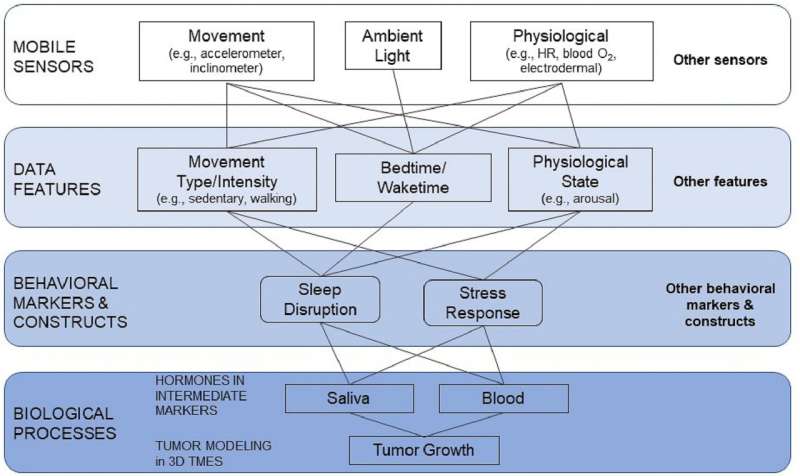This article has been reviewed according to Science X's editorial process and policies. Editors have highlighted the following attributes while ensuring the content's credibility:
fact-checked
trusted source
proofread
The secret to better cancer care could already be on your wrist

Your smartwatch could be the key to better, more personalized cancer care, UVA Cancer Center researchers suggest. A team of UVA Health researchers has demonstrated the potential of wearable and mobile devices such as smartwatches and smartphones to help doctors tailor treatments to the needs of individual patients. The scientists found that they could use wearable devices to predict patients' levels of cortisol, the insomnia and stress hormone.
Results from their laboratory experiments suggest that patients with pancreatic cancer who have high cortisol levels from disrupted sleep will experience faster growth of their tumors; that suggests that doctors could leverage this information from patients' mobile devices to help at-risk patients keep their cortisol levels down and, in turn, slow their tumor growth.
While the work is still in the early stages, the UVA scientists say their efforts demonstrate the tremendous potential of "mobile sensing" for improving and individualizing cancer care. As so, they have charted out an ambitious plan that would bring together experts in many different areas—from psychology to engineering/data science to oncology—to capitalize on the untapped possibilities of devices that most of us already carry in our pockets or wear on our wrists.
"Our vision is that this could one day lead to individualized cancer treatment that is tailored to the behavioral health profile of the individual patient," said researcher Philip I. Chow, Ph.D., of the University of Virginia School of Medicine's Department of Psychiatry and Neurobehavioral Sciences and UVA's Center for Behavioral Health and Technology.
"We know that patients are diverse in terms of their mental and physical health. Things like insomnia and distress could be important factors in how quickly a patient's tumor grows and how resistant it is to cancer treatments. We're trying to advance a more precise model of care that takes into account a patient's health profile when making decisions about their cancer treatment in order to improve outcomes. It's a bit outside-the-box thinking, and to our knowledge nobody else is doing it."
Tapping tech to improve cancer care
In a new scientific paper, Chow and his collaborators, including UVA's Dan Gioeli, Ph.D., a cancer biologist and co-principal investigator on the research, argue there is "strong but unrealized potential to harness people's mobile sensing data to improve our understanding of their cellular and biologically based diseases." This, they say, has been made possible by recent breakthroughs in our ability to model cancer tumors.
Data about patients' hormones from wearable and mobile devices could be fed into such systems so that doctors could have unprecedented insights into an individual patient's disease and cancer progression, the researchers say.
By using a system that models how tumor cells grow (called the tumor microenvironment system, or TMES), the UVA team revealed that pancreatic cancer cells grew much faster in people with high cortisol from disrupted sleep. But there are many other potential applications of the technology, from understanding how patients' behaviors affect their cancers to benefiting fundamental cancer research, the researchers say.
"By bringing together different scientific disciplines, we can more effectively model cancer in the laboratory and then possibly learn, one, how a patient's cancer will respond to specific therapies and, two, how helping manage a patient's sleep or stress levels can impact that therapy," said Gioeli, of UVA's Department of Microbiology, Immunology and Cancer Biology. "It is incredibly exciting to be working on a team of scientists with such diverse expertise to do something unique and potentially impactful for patients."
The UVA researchers envision that one day soon patients might wear a smartwatch connected to an app on their phones that would securely transmit encrypted data to their health care providers. Artificial intelligence would estimate their hormone levels from their behavioral patterns, and those levels would be displayed in their electronic health records so that clinicians could leverage the information to make the best care decisions.
"Continuously monitoring patients' underlying hormone levels has immense potential for improving their care, given how impactful they are to cellular function and body systems," Chow said. "This work is the result of a collaboration across multiple disciplines, including mental and behavioral health, engineering, data science, medical oncology, surgical oncology and cancer biology. By combining our expertise, our aim is to advance cancer treatment that is more precise and tailored to the individual patient."
The researchers have described their plan in the journal Internet Interventions.
More information: Philip I. Chow et al, Mobile sensing to advance tumor modeling in cancer patients: A conceptual framework, Internet Interventions (2023). DOI: 10.1016/j.invent.2023.100644



















